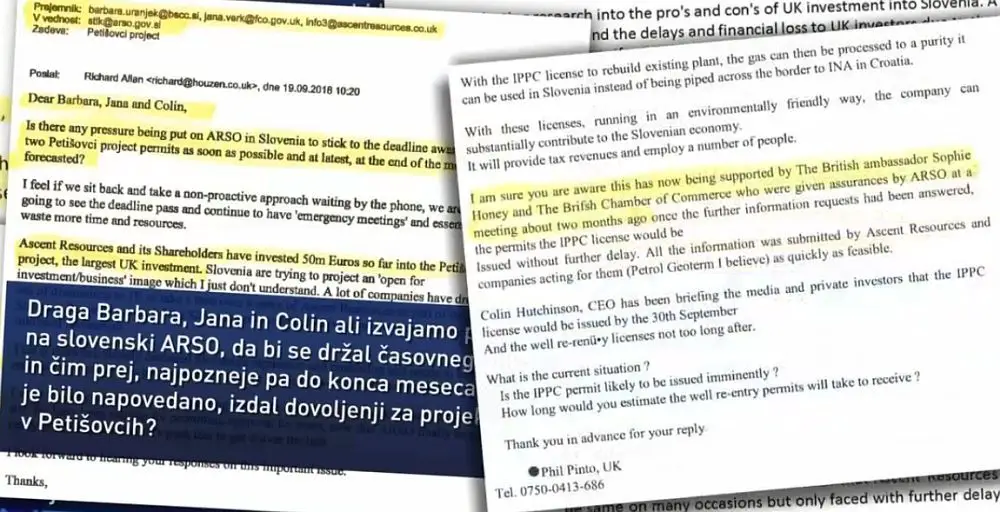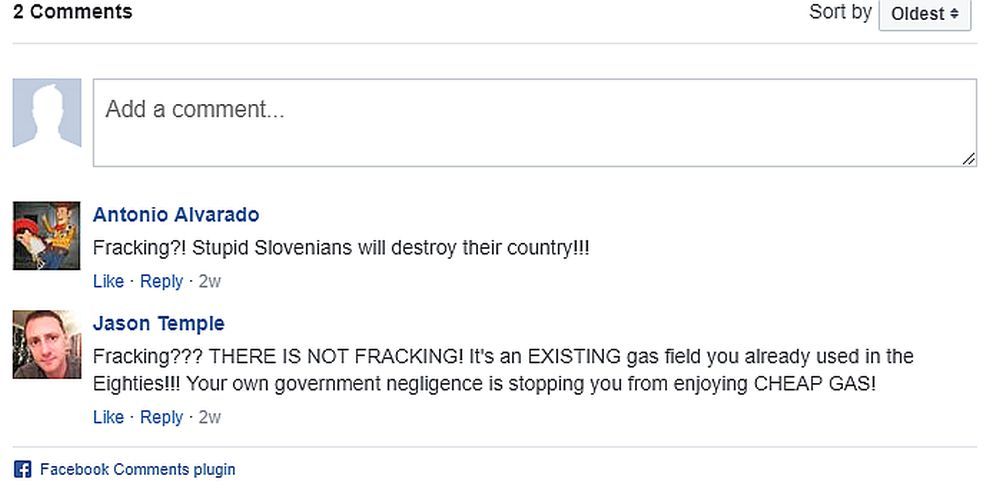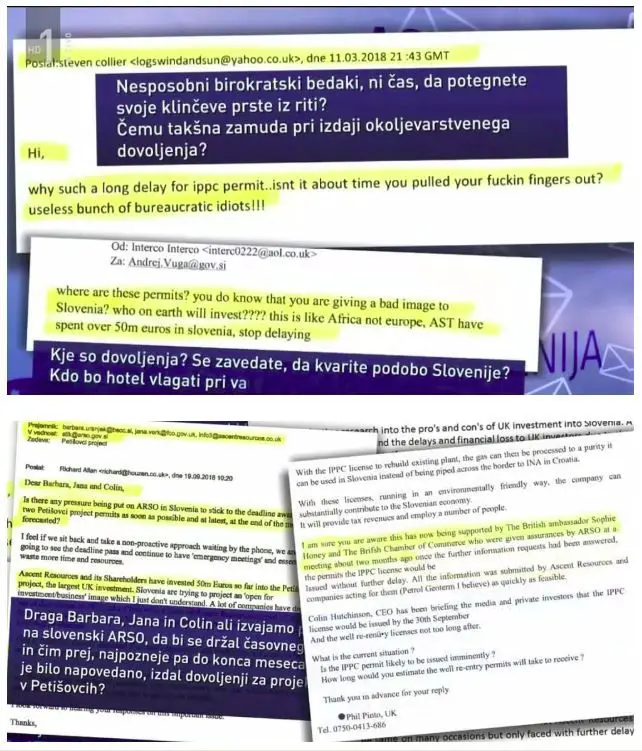Ljubljana related
PM Surprised By Hunt Lobbying for UK Fracking Company: “In Slovenia We Operate in Line with the Law”
STA, 8 March 2019 - Prime Minister Marjan Šarec told the weekly Mladina that UK Foreign Secretary Jeremy Hunt had raised the issue of a UK company's gas extraction project in the north-east of Slovenia during their talks in Ljubljana at the end of February. Šarec said he found the manner of inquiry unusual.
The fracking attempts in the Petišovci area were stopped by former Environment Minister Jure Leben after UK company Ascent Resources had been pressuring the country to issue an environmental permit and even threatening with a lawsuit before an EU court.
Several environmental NGOs and parties had also accused UK Ambassador Sophie Honey of lobbying and putting pressure on Slovenian authorities to secure the permit for fracking.
Šarec said in an interview with Mladina that the case had come up in the talks with Hunt in Ljubljana on 21 February.
Asked whether Hunt had lobbied during the talks, Šarec replied in the affirmative. "Yes, his questions regarding this case were, I must say, unusual.
"I believe that such talks do not become a foreign secretary, because it makes the whole thing resemble horse-trading."
Šarec said he had told Hunt that "in Slovenia we operate in line with the law."
"I'd like to point out that the permit for fracking is not a matter of a favourable political stance toward this or other party but a matter of legislation.
"I am also personally convinced that these procedures for extracting oil or gas undoubtedly entail certain environmental risks."
Šarec also noted that lobbying was usually reported to the Commission for Corruption Prevention but it this case this was not necessary, because he had publicly spoken about it now.
All our stories about fracking in Slovenia can be found here, while all our stories about Jeremy Hunt are here
February 27, 2019
In an article by Siol, published today and titled “He talked about ‘Soviet vassals’ and lobbied for ‘fracking’ in Pomurje” (Govoril o "sovjetskih vazalih", lobiral pa za "fracking" v Pomurju), the authors claim that one of the main reasons behind the British Secretary of State Jeremy Hunt’s visit to Slovenia last week was to lobby for environmental permits for the ecologically controversial gas extraction in Pomurje.
Although most of the Slovene public remembers Mr Hunt’s visit last week for his patronising appraisal of Slovenia’s progress from a “Soviet vassal state” to an EU and NATO member, little has so far been said about the alleged other purpose of his visit, nor the topics of discussion with his Slovenian counterpart, the Foreign Minister Miro Cerar, beyond Brexit-related matters.
Hunt brought up environmental permits for “fracking” at Petišovci
However, the Slovenian Ministry of Foreign Affairs has confirmed to Siol.net that the Petišovci project was one of the topics discussed during the visit. Siol quotes the Ministry’s response to their inquiry as follows:
"The Foreign Minister also addressed investment cooperation, including the investment of the British company Ascent Resources in Petišovci. The Minister of Foreign Affairs of the Republic of Slovenia, Miro Cerar, explained that the procedures in this case are in line with Slovenian legislation, in accordance with the prescribed high environmental standards.”
According to information Siol claims to have obtained from diplomatic circles, the Petišovci project was one of the priority topics in Hunt’s meeting with Cerar. Furthermore, Ascent Resources CEO Colin Hutchinson was also in Slovenia last week, albeit only meeting with partners on the project. Hutchinson emphasised that he did not meet with the British Ambassador on this trip, and has never met Jeremy Hunt.
Environmental permits for “fracking” at Petišovci
ARSO (Agencija Republike Slovenije za okolje, the Ministry of the Environment and Spatial Planning) is currently deciding on two environmental permits applied for by Ascent Resources and a local partner and minority shareholder Geoenergo: a permit that would allow for the operation of a gas processing plant, and another to boost production of the two existing wells by the method of “hydraulic stimulation”.
Although ARSO refused to comment on the possible results, Siol reports that based on unofficial information it will order the applicant to carry out an environmental assessment, which in turn means that no “fracking” permits will be granted for now.
Meanwhile Leben offers his resignation to PM Šarec
Hunt’s visit coincided with what Siol termed a “media war” against Jure Leben due to controversial second-rail model public procurement when he still served as a state secretary at the Ministry of Infrastructure of the previous government. Jure Leben offered his resignation to the Prime Minister Marjan Šarec yesterday. The news of his departure has been met with approval on social media by Ascent Resources shareholders, who have seen Mr. Leben as one of the main obstacles for gas extraction in Petišovci.
Siol also claims that the British Ambassador, Sophie Honey, met with Mr Leben last year to discuss the issue, a meeting that the report says ended with “raised voices”. Leben then made a report to the Commission for the Prevention of Corruption (Komisiji za preprečevanje korupcije), while the British Embassy in Ljubljana issued a strong denial that it had attempted to influence the decision of the Slovenian authorities.
All our stories on fracking in Slovenia can be found here.
Ascent Resources’ quest to gain the permits needed to develop its Petišovci gas field continues, reports the investment website Morning Star, with the threat of legal action against Slovenia if the delays continue. The company requires one permit to install a gas processing facility, while another is needed to re-stimulate wells to increase their production, a process commonly known as fracking.
CEO Colin Hutchinson was quoted on Monday as follows: "While the pace of progress in Slovenia remains frustratingly slow, as we continue to follow the process and provide those responsible for making the permitting decision with all of the information they require, based on the unarguable benefits for the country I remain hopeful the permits will be awarded in due course."
Some of the messages sent in support of Ascent Resources. Screenshot from RTV Slovenia
The project has been in the news in recent months because of the environmental concerns it raises, but also because of a number of harassing messages that were sent to government officials in Slovenia, including the Minister of Environment. While the author(s) of the messages have not been identified, all expressed support for Ascent Resources.
Although new developments are stalled production at the site is continuing, and the website notes that in January the firm was able to extract 412,763 cubic metres of gas, for expected revenues of about €70,000, down slightly from the figures seen in December.
Ascent Resources is a penny stock, currently trading at 0.28p, or £0.0028
Ascent Resources, the UK-based firm engaged in a long-running attempt to begin fracking at Petišovci, a plan that has been delayed due to a lack of permits, said on Monday that it’s now looking to develop other projects outside Slovenia.
A report published on the London South East website, sets out how the company is still waiting on permits to re-stimulate it’s existing wells to produce more gas from the field, and install a processing facility to enable the natural gas it produces to enter the Slovenian national grid.
The story became more heated in late 2018, with accusations that Ascent Resources shareholders, or other interested parties, had been sending threatening messages to the Slovenian Environment Agency, as reported here, as well as threats by the company to sue the Slovene government for damages.
The firm’s Chief Executive, Colin Hutchinson, is quoted as saying "While the Petišovci project remains a potentially very valuable asset, I am pleased that we now have a way forward that is not entirely based on Slovenia and the award of permits.”
At the time of writing the shares of Ascent Resources (AST) were trading at 0.32 pence in London, down from 1.40 pence a year ago.
Ascent Resources, the UK-based firm involved in a four-year and sometimes heated dispute over permits for a fracking and gas-processing plant in Petišovci, Prekmurje, is about to raise the stakes with the threat of legal action against the Slovenian government. One recent issue in the case was a number of abusive emails that were sent by people claiming to be Ascent Resources investors to ARSO and the Environment Minister, a matter that is now receiving police attention in Slovenia.
Related: Slovenia’s environment vs foreign capital, corrupt officials and internet trolls
Speaking to London South East, CEO Colin Hutchinson said that while Slovenia remained a high risk environment for foreign investors he was hopeful that the two permits needed for the project to go ahead would eventually be granted by the Slovenian Environment Agency (Agencija Republike Slovenije za okolje, ARSO).
You can see London South East’s interview with Mr Hutchinson below in which he discusses the emails, fracking, the possible legal action the firm may take, and his hopes for the future
Related: Investors claim fracking in Prekmurje would benefit Slovenian gas consumers
STA, 13 December 2018 - Natural gas will be a major part of energy supply in Slovenia in the future and domestic production would greatly increase the reliability of supply, heard participants of a Thursday's event dedicated to energy.
Noting that natural gas plays a generally positive role in the EU's energy transition to meet climate goals, Jurij Vertačnik of the Ministry of Infrastructure said that establishing competitive domestic production would be positive for the country, which currently relies almost exclusively on gas imports.
It is however true that the required infrastructure will have to be adapted for other energy sources in the future, which entails certain technical as well as regulatory challenges, he acknowledged.
Petišovci gas well a missed opportunity
There is a gas well at the Petišovci field in the north-east of the country, but its potential is not utilised, said Miha Valentinčič, the head of Geoenergo, the Slovenian partner of UK's Ascent Resources which is exploring the gas field.
According to him, there has been a lot of intentional deception with regards to the project since 2011 that has slowed down the project.
"We're trying to conclude as soon as possible the procedures that are under way, including obtaining the necessary permits to maintain current production and to connect to the Slovenian network," he said.
Part of the gas pumped out at the Petišovci field is sold to local industrial partners and the rest to Croatian energy company INA, which built a connection to the nearby Zebanec gas field last year.
Related: Slovenia's Environment vs British Capital, Corrupt Officials and Internet Trolls
The UK firm has been trying to get the permits for some time now and has been in conflict with the Slovenian authorities because of a review of the procedure to obtain the permit to use hydraulic stimulation at the Petišovci field.
According to Miloš Markič of the Geological Survey, low-volume and high-volume fracturing should be distinguished, with the former allowed in most countries and the latter prohibited in Europe due to the population density.
December 8, 2018
The drama over Petišovci gas extraction permits and the British company Ascent Resources appears to be one of those classic tales of a conflict between one country’s sovereign right over its environmental protection standards and the profit-making interests of the international capital, backed by neoclassical economics’ arguments on the beneficial effects of any foreign direct investment on the local economies.
However, this textbook ideological conflict was given another spin by an army of internet trolls, who sent a series of harassing messages to Slovenian government officials, including the Minister of Environment, which resulted in strengthening the Minister’s police protection and an internal investigation into the procedures surrounding the issue of environmental permits by the Ministry’s environmental agency (ARSO). With the British Ambassador also involved in lobbying for the British firm, three Slovenian political parties have also demanded that her involvement be investigated.
The issue centres on fracking in Slovenia
Gas has been extracted at Petišovci, North East Slovenia, since the 1960s, first by state-owned enterprises, then in 2002 the concession was granted to Geoenergo d.o.o. whose equal shareholders are two state-owned firms, Petrol and Nafta Lendava. Initially, gas was being extracted under its own pressure, until, according to Gorazd Marinček, eco activist, the problematic method of hydraulic fracturing, or “fracking”, was introduced in two wells around the year 2011.
At least since 2011, Geoenergo has been in a 25/75 Joint Venture Agreement with the Maltese firm Ascent Slovenia Limited, a subsidiary of a London based company Ascent Resources (established in 2004). Another subsidiary of Ascent Resources, Ascent Resources d.o.o. is also located at the same address in Lendava. According to a recent edition of RTV Slovenia’s Tarča (Target) the only income of the Ascent Resources comes from unrefined gas extraction from the two remaining operating wells in Petišovci. The chain of companies, according to Tarča, reported a loss of over EUR 2.5 million last year, while awaiting the ARSO environmental permit that would allow it to deepen the wells and boost production, as well as to “build a processing plant to treat the gas for injection into the Slovenian national gas network achieving the highest possible price” (source).
The joint venture applied for and also received the environmental permits in 2014. However, environmental NGO’s appealed to the Ministry of Environment, although their appeal was rejected, so they moved further to the administrative court, which confirmed procedural inconsistencies in the permit issuing process and returned the matter back to the starting point at ARSO. The process was repeated again with an appealed to the Ministry, then the administrative court, which rejected the appeal, so that the process in this second round has not yet been cancelled.
Pressure from British investors, and irregularities in the permit process
Meanwhile, the British side of the venture has been growing increasingly impatient. On February 15 2018, the CEO of the Ascent Resources, Colin Hutchinson, visited then Slovenian Prime Minister Miro Cerar, and on July 4th representatives of the company met with the Economic Minster. However, in August, when the old government was leaving and new one hadn’t taken over yet, a meeting was arranged at the initiative of the British-Slovenian Chamber of Commerce. The invitations to all parties were dispatched by the Ministry's directorate, and, most problematically, the meeting was eventually attended by Nataša Petrovič, the director of the Environment and Nature Protection Office in charge of ARSO’s environmental permits.
Apparently, at this meeting, which, according to the Ministry was only of informative nature, promises were made to the Ascent Resources (AR) that the environmental permit would be ready before the end of September, which is what AR then announced to investors. At the end of October, however, the new Environmental Minister, Jure Leben, introduced an internal investigation into the possibility of any external pressures being exercised over the ministry’s officials in the process of issuing environmental permits. The investigation eventually confirmed irregularities in these procedures, which included the August meeting of Nataša Petrovič with the AR representatives. As Tarča reported: “the Office director has participated in the meeting and provided information on specific procedures, thereby raising doubts as to the autonomy and independence of the Office, and allowing public interpretations, harmful for the reputation of the Office and its officials.” Furthermore, no minutes of this August meeting exist nor has the lobbying contact been reported to the Corruption Prevention Commission.
Threats of legal action accompanied by hate mail
Also at the end of October, AR announced it would explore taking Slovenia to the EU Court after the company failed in its attempts to get a response from the Environment Agency on Jure Leben’s internal inquiry into the awarding of environmental permits.
Furthermore, the number of offensive messages sent to ARSO, presumably by enraged British shareholders, multiplied and also hit Minister Leben’s mailbox and Twitter account. The minister is currently under enhanced police protection while a criminal investigation into the source of messages is taking place.



Insulting comments by what appear to be fake Facebook accounts even managed to find their way to our own website, trying to stir the fight under an article on the matter. Luckily, nobody took the bait.

Let’s not forget that in America in 2016 “Russian actors organized both anti-Islam and pro-Islam protests in the same location at the same time on May 21, 2016, using separate Facebook pages operated from a so-called troll farm in St. Petersburg”. The whole mission costed about US $200. (Source)
The British Embassy connection
To complicate the situation a bit further, on November 13 the British Ambassador to Slovenia, Sophie Honey, paid a visit to the Environmental Minister Jure Leben, asking questions about the possible deadlines for environmental permits and also about the results of the internal investigation. HMA Honey appears to have been advocating for the Petišovci project at least since January 2017, when she visited the site of the project and met with the Slovenian and British partners.
At about the same time three extra-parliamentary parties, Solidarity, Pirates and the United Left, asked for an ethical assessment of the British Ambassador’s conduct, who they believed lobbied the previous government to accelerate the license award process.
As reported by Delo, the British Embassy in Ljubljana denied the allegations, and explained that HMA Sophie Honey did not in any way want to influence the Slovenian decision, but only highlighted the need for predictable deadlines in procedures for foreign investors, including for AR, with this being an important part of achieving the goals of increasing bilateral trade and investment between the states.
Furthermore the tree political parties stated that they saw AR’s attempt to take Slovenia to the EU Court, to overrule the Slovenian system, as a kind of threat, even if no other pressures were being applied.
Let’s not forget that the confidence of Slovenia’s environmental administration in dealing with pressures from foreign capital rose significantly just last month, when the French multinational Lafarge sued Slovenia over being denied a renewed environmental permit after years of burning banned petroleum coke in its cement plant in Trbovlje. Lafarge finally lost its case at the Slovenian Administrative court, and is currently shutting down its operations in Slovenia.
STA, 12 November 2018 - Joško Knez, the director general of the Environment Agency (ARSO), stepped down on Monday, over an internal review of procedures for granting environmental permits for a controversial Ascent Resources gas extraction project in the far north-east of the country.
According to a report by the news portal Siol, Knez has resigned because irregularities were uncovered in the review ordered by the new Environment Minister Jure Leben last month.
Leben ordered the oversight of procedures for extracting gas in the Petišovci area by the UK's Ascent Resources and its Slovenian partner Geoenergo. The latter is owned by energy companies Petrol and Nafta Lendava, which are in majority ownership of the state.
According to a recent report by investment research firm Morningstar, Ascent Resources had received "repeated" private assurances from senior government officials, especially at the Environment Agency, that it would be getting the permit soon.
Apparently the review struck a nerve and the UK-based company launched an offensive against Slovenia, and Leben in particular.
At the end of October, Ascent Resources said it was mulling taking Slovenia to "EU courts" over the delay, while the minister has had to face an onslaught from shareholders and the management of the UK company.
Ascent Resources director and shareholder Colin Hutchinson tweeted that the company "invested EUR 50m in the project to date and will not walk away. The permitting system in the country is in need of urgent reform and foreign investors should be very wary of investing until this happens".
However, the Environment Ministry said today that "today's report corroborates that the minister's suspicions have been warranted", as the principles of independence and autonomy of ARSO were violated in the two procedures.
Moreover, the report says that "persons from abroad apparently do not find unacceptable and contentious putting pressure on Slovenian officials and are willing to repeat them".
The findings of the review will be forwarded to the relevant authorities, including "all the efforts to put pressure on the ministry during the review".
Just today, three non-parliamentary parties and several environmental NGOs urged Foreign Minister Miro Cerar to summon UK Ambassador Sophie Honey over lobbying for the UK company.
The Pirates, Solidarity, and the United Left and Workers' Labour Party (ZL-DSD) alliance, accuse Honey of lobbying and putting pressure on Slovenian authorities to secure the environmental permit for fracking in the Petišovci area.
Ascent Resources claims it would use hydraulic stimulation and not fracking to extract gas in Petišovci. This was corroborated by Geoenergo, which said that the method used in Slovenia would differ from fracking as used in the US significantly.
The procedure, "cannot and must not be equalised with the hydraulic treatment or fracturing of shale ... There are significant differences between the procedures in Slovenia and those in the US ... that basically stem from the difference in the geological profile of the rock".
But the environmental alliance is unconvinced. "We're witnessing a reality show where multinationals are treating us as natives from the most underdeveloped countries and heaping alternative truths on us in line with the worst case of fake news," environmental activist Gorazd Marinček told the press today.





